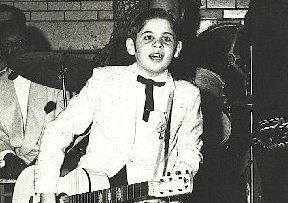
Wallert performing as a youngster
Charles Wallert was destined to work in the music industry.
Born in Brooklyn, Wallert immediately gravitated towards all things musical, regularly putting on impromptu performances as a toddler.
“When I was very young—I must have been two years old, a little less—I would imitate Johnnie Ray,” Wallert said. “My mother would take me to the ice cream parlor and the teenage girls would get a kick out of it and put more nickels in the jukebox.”
“I guess because I got a response from teenage girls, that might have triggered something in me,” he added with a chuckle. “But in all seriousness, I think music is a very soulful thing. It’s within our fiber.”
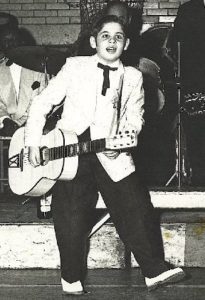
Wallert performing as a youngster
Regardless of the actual reason for his earliest musical motivation, Wallert seemed to have an innate musical ability as he grew up. He was playing guitar at just 5 years old, reading music before he could even read English. At age 7, he had his first job in the entertainment industry, imitating Elvis at his local PAL center for $20. In high school, his band was booking paid gigs, even performing at the New York World’s Fair.
With that kind of musical upbringing, it’s no surprise that Wallert would go on to have a highly successful career as a record producer, working with the likes of O.C. Smith, George Benson, Ronnie Limar, Dionne Warwick, and Cuba Gooding Sr. and The Main Ingredient.
“I’ve been fortunate enough to work with some great, great people,” Wallert said. “But it’s not a job to me. It’s who I am.”
Wallert is the very definition of a people person, which is perhaps one of the biggest reasons for his success in the entertainment industry. He exudes passion. He genuinely cherishes the relationships he builds and the friendships he makes, and those relationships—along with his sincere, down-to-earth personality—have helped propel him to new heights throughout his career.
“We’re not people who do business and happen to become friends,” Wallert says of the numerous musical acts he’s worked with through the years. “We’re friends that happen to do business.”
Despite Wallert’s natural affinity for music, for a period of time, it seemed his skills with a football would lead him down a different path in life. He caught the attention of multiple college and professional coaches as a young quarterback for St. John’s Prep, but as it turns out, Wallert’s football talents didn’t lead him to the gridiron. Instead, they played a role in further solidifying his future in music.
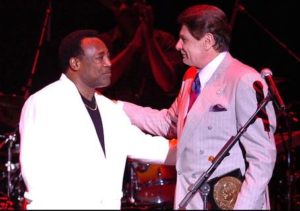
Onstage with George Benson
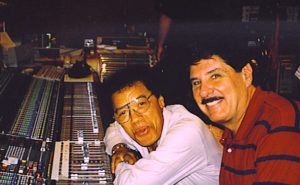
In the studio with O.C. Smith.
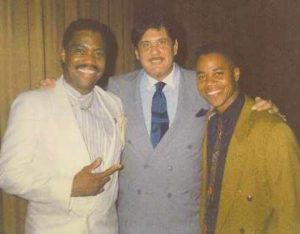
Below, Wallert with Cuba Gooding, Sr. and Cuba Gooding, Jr.
Following in the footsteps of “Broadway Joe”
As the story goes, a 15-year-old Wallert had the opportunity to attend a football camp where Kansas City Chiefs head coach Hank Stram was serving as a coach.
“After the first night, people were talking about the way I was throwing, and Stram and a bunch of coaches came and watched me the second night,” Wallert said. “It wasn’t as organized as it was today. That was the way they got to keep an eye on young people. You had to find them where you could.”
Stram was impressed with Wallert’s abilities with the pigskin, and after the football camp, they kept in touch. Whenever the Chiefs came into town to play the New York Jets, Stram would invite Wallert to hang out on the sidelines at Shea Stadium. For most teenage sports fans, that would be a once-in-a-lifetime experience, but for Wallert, it was run-of-the-mill. He already had a regular gig with the New York Giants, serving on their “chain gang” and performing various tasks on the sidelines each season. Even so, Wallert wasn’t about to pass up the opportunity to spend more time around the pros.
“When I was a freshman in college, the Chiefs played the Jets again, and it was Joe Namath’s second year,” Wallert said. “I was on the field with Stram and he said, ‘You wanna meet Joe Namath?’”
Wallert and “Broadway Joe” exchanged pleasantries. Little did either of them know at the time, but it wouldn’t be their last meeting. Over the following few years, Wallert and Namath would cross paths on a number of occasions—talking football, attending sporting events together, and ultimately becoming lifelong friends.
“To this day, he is my dear friend and a wonderful guy,” Wallert said of Namath.
An injury cut Wallert’s college football career at Central Connecticut State short, ensuring he would not follow in his friend Namath’s NFL footsteps. But the door opened for Wallert to follow Namath in another way. When NFL commissioner Pete Rozelle agreed that Namath sell his ownership stake in his popular restaurant and nightclub Bachelors III, Namath’s teammate and fellow club owner Ray Abruzzese asked Wallert to become a partner in Namath’s place.
“It was fabulous. I had just turned 21 and was just finishing college. Just old enough to be on the liquor license,” Wallert quipped.
For many, becoming a partner in a wildly successful establishment at such a young age would be the pinnacle of their career. But Wallert was just getting started.
A Trip to La-La Land
In 1972, Namath was booked to appear on The Flip Wilson Show, and Wallert traveled with Namath to Los Angeles for the week to tape the show.
“One day, Joe made the arrangements to go see Elvis in Las Vegas,” Wallert recalled. “It was a great surprise. It was a thrill. One that I will never forget.”
After seeing Elvis, Wallert accompanied Namath and Namath’s attorney, Jimmy Walsh, to a Los Angeles restaurant, where they struck up a conversation with “this little guy at a table.”
“This guy was asking me about the show, and we were talking,” Wallert said. “He asked me what record company I worked for, and I said, ‘No, I own a restaurant.’”
The man thought Wallert was joking. Surely, the way Wallert was able to discuss the Elvis show with such prowess, he must have been in the music industry. Walsh convinced the man at the table that Wallert was not kidding.
“‘Well, young man,” the little guy at the table told Wallert. “I’ve never told anybody this before, but I’m going to tell you: you should be a record producer.’”
“That guy was Phil Spector, one of the best producers—maybe the best of all time,” Wallert revealed. “So, I kind of took that pretty seriously, even though I hadn’t been in a recording studio since I was probably 15.”
Kicking off a New Career in the City of Brotherly Love
Motivated by Spector’s advice, Wallert set out with the goal of breaking into the music industry.
“I took my time,” he said. “I started looking at and following producers I liked and realized what I wanted in my sound—and that was good songs, good melody using real instruments—and I’ve stuck with that to this day.”
After laying the groundwork for his new career path, Wallert’s first breakthrough came in Philadelphia with artist Ronnie Limar.
“The very first record that I wrote and produced got a record deal for Ronnie,” Wallert recalled proudly.
The deal with Limar was just the beginning. Wallert would go on to establish himself as an accomplished songwriter in addition to his work as a renowned producer, due in part to the emotional elements in the music he wrote.
“There are some songs that I’ve written from feelings that I’ve had, and they seem to always work out the best,” he said. “The audience seems to connect with that. A singer sings lyrics and notes. An artist sings lyrics and notes, but you hear the passion and sincerity.”
Despite all of his success in a career that’s still going strong (“I just came back from Phoenix, where I spent a few days with George Benson—we’re working on some new material for release next year”), Wallert looks back at his career and he’s in awe of what he’s been able to accomplish.
“To work with the great O.C. Smith, who was just an incredible vocalist, and Cuba Gooding Sr. and The Main Ingredient, who have such a different sound, and George Benson, my god,” Wallert said. “I’m proud of all of it.”
A natural knack for music, the uncanny ability to cultivate relationships, and a few instances of being in the right place at the right time all contributed to Wallert’s success. But perhaps the biggest reason Wallert has amassed such an impressive résumé of accomplishments is his positive outlook on life and his overwhelming dedication to his craft.
“The only way you have success is to keep going,” he said. “We’re all works in progress. We all have to keep going. People say ‘think positive,’ but more importantly, you have to feel positive. Once you feel positive, then everything else will emanate from the inside out.”
The stars aligned for Wallert, in more ways than one, to shape him into the man he is proud to be today, both personally and professionally. But his undying passion in everything he does is what truly sets him apart.
“If there’s something you really want and have a passion for, somehow, it finds a way to materialize in your life,” Wallert said. “If you give your passion and your dedication to it, everything will take care of itself.”
——————————-
Lifelong teammates
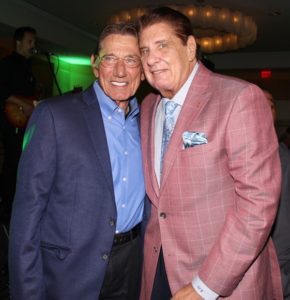
Although Wallert never played football alongside Namath, they share a sense of camaraderie as teammates would, and Wallert is always happy to support his friend on any projects he undertakes.
One such endeavor that Wallert is a part of is the Joe Namath Foundation (www.joe namath.org). Wallert was a founding member of the foundation, and he’s proud of the work Namath does through the charity.
“The foundation does wonderful work for traumatic brain injury as well as children’s charities,” Wallert said. “Joe likes to give back. He’s a very generous guy.”
Wallert also occasionally accompanies Namath when he promotes his book, “All the Way: My Life in Four Quarters.” He recently visited the 92nd Street Y in New York City where Namath did a question and answer session.
“He was fantastic,” Wallert said. “Even though I’ve known this guy for three-quarters of my life, it inspired me. I would recommend the book.”
————————-
Bringing his story to the big screen
To document the fascinating path his life has taken and his various encounters with some of the music industry’s biggest stars, Wallert is currently working on a way to tell his story to the masses.
“I’m working on a book and a screenplay about my life, called ‘We Made Them Dance,’ with the artists I’ve worked with and the people that have been in my life,” Wallert said.
The book and screenplay will feature a number of incredible stories from Wallert’s career, including this gem he shared with JerseyMan/PhillyMan Magazine.
“For example, when I was with O.C. Smith in Houston, these people invited us to their home and their 12-year-old daughter sang for us, and we thought she was great,” Wallert said. “That girl was Beyoncé.”
Robert P. Johnson, who wrote the screenplay for The Temptations miniseries, is developing Wallert’s screenplay, while music author Will Romano is slated to pen the book.
———————————-
The value of an encouraging word
While Wallert always knew he had the musical chops to make it in the industry, he never pursued music as a career until that fateful conversation with Phil Spector in Los Angeles lit a spark under him.
“What that conversation did for me – I mean, we had a 20 minute, half hour conversation about Elvis and his music and the instrumentation – was give me confidence in what I knew and my musical instincts, and kind of acknowledged that I was on the right track,” Wallert said. “We all need that in life at some point, no matter how confident we are. When someone whose accomplishments we respect gives us a stamp of approval, it helps. That’s why I think people should be nurtured and given a pat on the back. I don’t believe in the stick. I believe in the carrot.”

